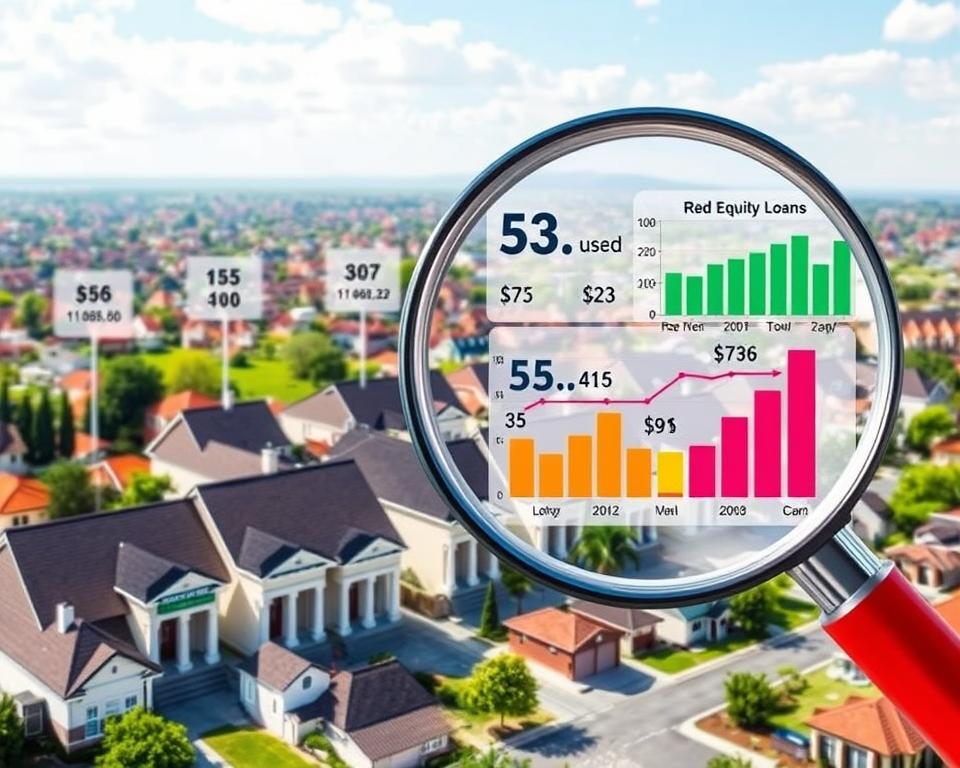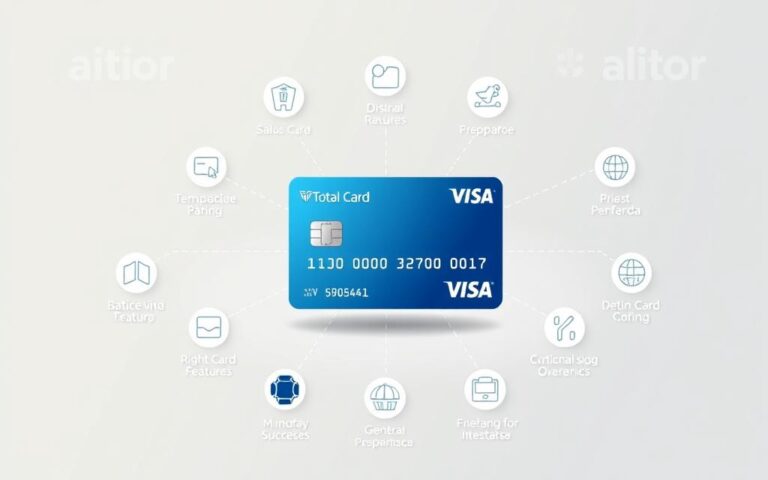Advertisement
Did you know home equity loan rates can be very low? They start at 8% or less, based on your credit score. Credit card rates often range from 15% to 20%. This means home equity loans can be a better choice for borrowing. Lenders may let you use up to 80% of your home’s equity. This can help with debt, home repairs, or sudden expenses.
Now, let’s talk about the right time to get a home equity loan. This is also called a second mortgage or HELOC. Knowing the benefits of home equity loans helps you make smart choices. It’s about aligning with your financial goals.
What is a Home Equity Loan?
A home equity loan is like getting a second mortgage. It lets you borrow against your home’s equity. You can usually borrow up to 80% to 85% of your home’s value, minus what you still owe. Understanding these loans helps you make better financial choices.
Definition and Overview
These loans let you use your home’s value for cash. You need to have enough equity in your home to qualify. Most lenders want you to have a Loan-to-Value Ratio of 80% or less. This means you need at least 20% equity in your home.
How It Works
Home equity loans have fixed interest rates. This makes your monthly payments predictable. The interest rates are often around 8% or lower. This makes them good for big, one-off expenses.
Repayment periods can vary from five to 30 years. This gives you flexibility in managing your debt. Getting funds from a home equity loan usually takes about 55 days. This is slower than HELOCs, but the stable repayment plan is a plus. Just make sure you can handle the extra debt.
Benefits of Home Equity Loans
Home equity loans have many benefits, making them popular among homeowners. They can be a smart fit for your financing needs.
Lower Interest Rates
Home equity loans come with lower interest rates. These often range between 8% to 10%. This is cheaper than rates for personal loans or credit cards. So, these loans can be wise for covering various expenses.
Tax Deductibility
Home equity loans can also be tax deductible. This works if you spend on things like home improvements. If you itemize deductions on your tax returns, the interest you pay could be deducted. This can save you money at tax time, adding to the loans’ benefits.
Flexibility of Use
These loans are also flexible in how you can use them. You might fix up your house, pay off debt, or handle emergencies. They allow for smart spending based on your needs.
When to Consider a Home Equity Loan
Getting a home equity loan makes sense in certain money situations. It lets homeowners choose wisely to match their needs. Here are key times you might want a home equity loan.
Home Improvements
Home improvements can raise your property’s value. A home equity loan helps pay for upgrades. It makes your home better and could increase its future selling price.
Debt Consolidation
Many use home equity to consolidate debt. It turns many high-interest debts into one with lower interest. Home equity loans usually have rates between 3.5% and 5.5%. This makes them a smart option for handling debt.
Education Expenses
Paying for school can be tough for families. A home equity loan uses your house’s value for money. It helps pay for college, easing the load of high-interest student loans.
Emergency Expenses
Life can throw unexpected expenses your way, like medical bills or big home fixes. A home equity loan offers a backup for these surprises. It has lower interest rates, making it easier to pay back.
Types of Home Equity Loans
Different home equity products can guide your financial choices wisely. You can choose between Fixed-Rate Home Equity Loans and Home Equity Lines of Credit (HELOCs). Each is suitable for various needs and situations.
Fixed-Rate Home Equity Loans
With fixed-rate home equity loans, you get a lump sum that you pay back over a set period. It can range from five to 15 years. The interest rate stays the same, so your payments are always consistent. You can often borrow up to 80% of your home’s value.
This option is great for big projects or education expenses. If you use it for qualifying home improvements, your interest might be tax-deductible.
Home Equity Lines of Credit (HELOCs)
HELOCs are more flexible. They let you borrow as you need, up to a certain limit. You have about 10 years to draw funds, followed by a repayment period of 10 to 20 years. The interest rates vary, which means they can go up or down.
It’s important to understand all terms and costs, including transaction and annual fees. Knowing these helps you make the best choice.
| Feature | Fixed-Rate Home Equity Loans | Home Equity Lines of Credit (HELOCs) |
|---|---|---|
| Loan Structure | Lump sum payment | Credit line with draw feature |
| Interest Rate | Fixed | Variable |
| Draw Period | N/A | Typically 10 years |
| Repayment Period | 5-15 years | 10-20 years after draw period |
| Typical Use Cases | Home improvements, debt consolidation | Flexible borrowing for various expenses |
Both Fixed-Rate Home Equity Loans and HELOCs are key to financial planning. It’s important to assess your needs. Options like Cash-Out Refinance may also fit into your financial strategy. Understanding all options helps you avoid borrowing pitfalls.
Understanding the Application Process
When you apply for a home equity loan, you need to be ready. You have to show lenders that you’re serious. This means knowing how much equity you have, your credit score, and having the right documents.
Step 1: Assess Your Home’s Equity
To start, figure out how much equity you have in your home. This is done by finding the current market value of your house and subtracting any mortgage you still owe. Lenders usually let you borrow up to 80% of your home’s value. Getting a home appraisal will tell you exactly what your home is worth today.
Step 2: Check Your Credit Score
Your credit score is crucial when you apply. You’ll need at least a 620 to be considered. But, if your score is above 700, you could get better loan terms. Check your score before you apply, so you know if you need to fix anything.
Step 3: Gather Necessary Documentation
Having the right paperwork is key. You’ll need:
- Tax returns from the last two years
- W-2 statements
- Proof of income
- Current mortgage statements
- Bank statements
Your Loan-to-Value Ratio plays a big role too. It helps lenders decide how much they’ll lend you. Having your documents ready shows you’re organized and speeds up the process.
| Document Type | Purpose |
|---|---|
| Tax Returns | Verify income stability |
| W-2 Statements | Provide proof of employment |
| Proof of Income | Corroborate financial capability |
| Current Mortgage Statements | Show existing debt |
| Bank Statements | Reflect financial history |
Being prepared makes the whole process easier. It means you can talk to lenders with confidence. Follow these steps to have a good chance at getting the home equity loan you want.
How to Choose the Right Lender
Finding the ideal lender for your home loan needs some work. Look at many lenders to find the best fit for your money plans. By checking out Lender Options, you’ll see what each one offers.
Researching Lender Options
Start by looking at different lenders like banks and online options. Remember, most top home equity lenders are traditional banks. But online lenders, like Rocket Mortgage, might get you quicker results and good rates.
Comparing Rates and Fees
When checking out Comparing Rates, focus on interest rates and extra charges. Lenders often have various fees at closing. Knowing these fees helps you understand the total cost, helping you make better choices.
Reading Customer Reviews
Customer feedback tells you a lot about a lender’s service. Look into their customer support, quickness, and satisfaction levels. Choose lenders known for clear dealings and competitive rates for your best interest.

| Lender Type | Benefits | Drawbacks |
|---|---|---|
| Traditional Banks | Established reputations, variety of products | Potentially higher fees, slower processes |
| Online Lenders | Faster approvals, often lower rates | Less personalized service |
| Credit Unions | Lower fees, personalized service | Membership requirements |
| Savings and Loan Associations | Potentially competitive rates | Limited availability in some areas |
Understanding these points will guide you in choosing well. Look at everything from lender types to costs. This careful method will match you with a lender that meets your financial aims.
Key Factors Affecting Approval
When you apply for a home equity loan, lenders look at many things. They check your financial health to decide if you qualify. They consider what interest rate to offer you and how much you can borrow.
Credit Score Requirements
Your credit score is very important in getting approved. Lenders mostly want a score around the mid-600s. If your score is above 740, you have a better chance of getting a low interest rate. Keeping a good credit score is key to borrow money on better terms.
Debt-to-Income Ratio
Your Debt-to-Income Ratio tells lenders if you can handle more debt. They prefer a DTI of 43% or less. It shows you can manage your monthly payments well. A lower DTI not only helps you get approved but might also get you a better deal.
Loan-to-Value Ratio
The Loan-to-Value Ratio is about how much equity you can use. You need at least 20% equity in your home, but some lenders may allow 15%. They let you borrow up to 80% to 90% of your home’s equity. Keep your combined loan-to-value ratio under 90% to qualify for more.
| Factor | Typical Requirement | Impact on Approval |
|---|---|---|
| Credit Score | Mid-600s (740+ for best rates) | Higher scores improve chances |
| Debt-to-Income Ratio | 43% or less | Lower ratios are favorable |
| Loan-to-Value Ratio | 80%-90% maximum equity access | Maintaining below 90% is crucial |
Common Mistakes to Avoid
Many homeowners face problems when getting home equity loans. Knowing these mistakes helps you choose wisely. Main issues include borrowing too much, not getting the fees, and not looking at other options.
Over-Borrowing
Borrowing more than you can repay is a big mistake. It feels good to use your home’s equity. But, going beyond your means can be risky.
If the housing market drops, like in 2007-2008, you could lose equity. This may even put your home ownership in danger. Spending this money on fancy items, not home improvements, can harm your financial security for a long time.
Ignoring Fees and Terms
Overlooking loan fees is another error. Closing costs can be 2% to 5% of the loan. Not seeing these fees makes the loan less attractive.
It’s also key to understand your loan’s terms. Many are not aware that tax laws have changed. Not all interest may be deductible, which complicates finances.
Not Considering Alternatives
It’s a mistake not to look at other financial options. Home equity loans are not the only way. Alternatives like HELOC, personal loans, or low-interest credit cards could be better.
These options might offer more flexibility or lower costs. They can be more suited for sudden costs without risking your home equity.
Managing Your Home Equity Loan
Managing your home equity loan well can greatly help your money situation. It’s important to have a clear plan for paying it back. This helps you make payments on time and avoid problems. Understanding how to handle your money is key to getting the most from your home equity loan. Keep your records in order and watch your spending closely. This way, you can deal with any issues that come up.
Creating a Repayment Plan
Having a plan to pay back your loan on time is crucial. Here’s what to think about:
- Look at your monthly budget: Figure out your earnings and expenses to see how much you can pay on your loan.
- Pick a monthly payment amount: Choose how much to pay each month. Make sure it fits without hurting your other financial needs.
- Be ready for changes: Think about how changes in your money or unexpected bills might affect your payments.
Keeping Track of Your Finances
It’s important to keep your financial records organized. Here are ways to stay on top of your finances:
- Use budgeting tools: Apps and software can help you keep an eye on your budget, income, and loan repayment.
- Check your statements often: Always look at your loan statements to check your payments and how much you still owe.
- Set reminders: Use alerts to remember when your payment is due, so you won’t miss it.
Stay focused on your repayment plan and manage your money wisely. This will help you make the most of your home equity loan and reduce risks. Making smart choices will lead to financial health and a strong future.

Conclusion: Making an Informed Decision
Understanding Home Equity Loans is key to using your home’s value well. This article has shown the pros, cons, and crucial deciding factors. Being well-informed can result in great financial gains, especially for clearing debt or big buys.
Final Thoughts on Home Equity Loans
Think about this before getting a Home Equity Loan. You can usually borrow up to 85% of your home equity. They have lower rates than credit cards—5% versus 19%.
But, not paying back can risk your home. Always have a plan for managing your money. Compare these loans with other options like personal loans and credit cards for transfers.
Next Steps to Take
Now, you know more about Home Equity Loans. Start by checking your financial state and home equity. Look at different lenders and compare rates and fees.
Think about how you’ll pay back the loan. This will help you use this tool well and avoid dangers. Making informed choices can lead to good financial health in the long run.



